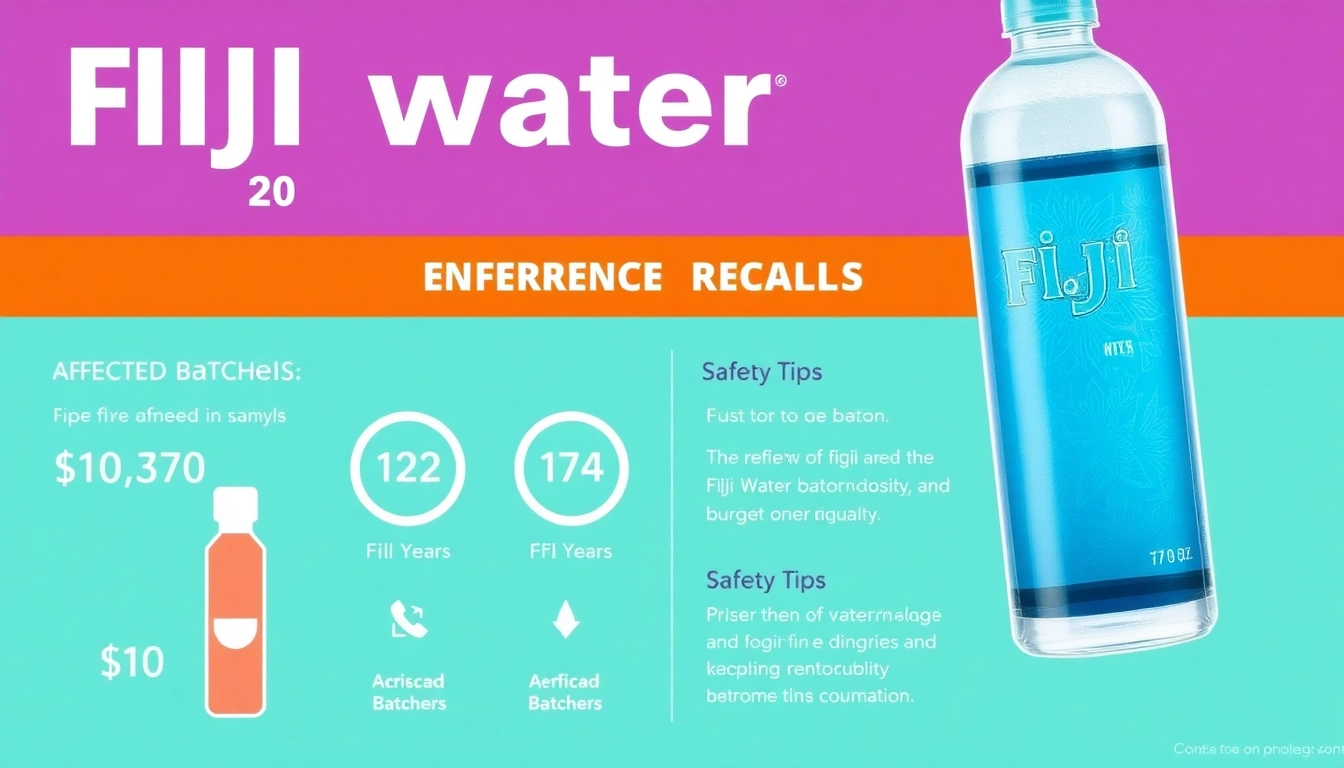Overview of the Fiji Water Recall 2024
The year 2024 has witnessed significant developments in the bottled water industry, particularly concerning Fiji Natural Artesian Water. A major recall was initiated, raising public awareness and customer concern. As consumers, we rely heavily on the safety and purity of bottled water for our hydration needs, and the fiji water recall 2024 has become a hot topic due to its implications for health and safety. This article will explore the details surrounding the recall, its implications, and important guidance for consumers.
What Led to the Recall?
The recall of Fiji water primarily arose from testing that revealed elevated levels of manganese and bacterial contamination in several batches of their bottled water. According to the Food and Drug Administration (FDA), the contamination was linked to production problems that occurred during a specific time period. This issue was significant enough to warrant immediate action, as manganese, while a naturally occurring mineral, can be harmful at elevated levels, especially for sensitive populations such as infants and people with certain medical conditions.
Bacterial contamination presented another layer of concern, with the presence of harmful bacteria potentially leading to gastrointestinal illnesses and other health complications. The company, Natural Waters of Viti Limited, acted swiftly to initiate the recall process to prevent any adverse health effects among consumers.
Timeline of Events
The timeline of the Fiji water recall began in early March 2024, when initial tests conducted by the FDA indicated the presence of manganese and bacteria in several cases of bottled water. Following these findings, a formal recall was announced on March 4, 2024. The situation escalated as additional testing revealed that nearly 1.9 million bottles distributed across various retail channels, including major online platforms like Amazon, were potentially affected.
As the recall progressed, the affected products were systematically removed from stores and distribution centers. By late March 2024, most of the concerned supplies had been pulled from shelves. Throughout this period, the company issued ongoing updates to inform consumers of the developments regarding the recall and safety of the products.
Impacted Products
The specific products affected by the recall included Fiji Natural Artesian Water bottled in 500 mL format, typically sold in packs of 24. These bottles were primarily produced in November 2023 and contained batch codes that identified them as part of the recall. Distribution channels included major retailers and e-commerce platforms, making the recall impactful on a national level and affecting a wide consumer base.
Consumers who purchased these products were urged to check the codes on their bottles and packaging to confirm whether their purchases were included in the recall list. The urgency and wide scope of this recall underscored the need for vigilance in consumer health and safety regarding bottled water.
Health Concerns Associated with Fiji Water Recall
The health implications of the Fiji water recall are profound, especially concerning the contaminants identified in the affected bottles. Understanding these concerns can help consumers make informed decisions about their water consumption and safety.
Understanding Manganese Levels
Manganese is a naturally occurring mineral found in various food and drink sources. It plays a crucial role in several bodily functions, including metabolism and bone formation. However, when consumed in elevated amounts, it can lead to a variety of health issues, particularly neurological concerns that affect cognitive processes and behavior.
The FDA recognizes that while manganese is essential in small amounts, excessive exposure—especially over prolonged periods—can lead to conditions such as manganism, a disorder that mimics symptoms of Parkinson’s disease. Therefore, the elevated levels detected in the recalled Fiji water bottles raised alarming red flags for public health officials.
Bacterial Contamination Risks
Alongside manganese levels, the detection of bacteria in bottled water poses serious health risks. Common bacterial contaminants can lead to gastrointestinal illnesses, manifesting symptoms such as diarrhea, nausea, and vomiting. In vulnerable populations, such as infants, the elderly, and immunocompromised individuals, these risks can escalate into more severe health complications.
The recall highlights the importance of strict quality control processes in bottled water production and the potential consequences of lapses in safety measures. Feeding consumers’ trust is crucial, especially for brands that have built their reputation on quality and purity, like Fiji Water.
Symptoms and Safety Precautions
For consumers concerned about their Fiji water consumption, it’s important to be aware of potential symptoms associated with manganese overexposure and bacterial contamination. Symptoms can differ based on the type of contamination and individual consumer sensitivity. Key symptoms to watch for include:
- Dizziness and headaches, which may indicate manganese toxicity.
- Gastrointestinal distress such as diarrhea or vomiting, suggesting possible bacterial infection.
- Neurological symptoms such as tremors, which may arise from long-term exposure to heightened manganese levels.
If you suspect you’ve consumed contaminated water, it is advisable to consult a healthcare provider, especially if you experience severe symptoms. In cases of illness linked to the recalled bottles, affected consumers may have grounds for reporting their situation to health authorities and pursuing claims for any medical expenses incurred.
How to Check if Your Fiji Water is Affected
For those unsure if their purchased Fiji water is part of the recall, there are specific steps you can take to verify your bottles’ safety. This section provides a comprehensive guide on identifying impacted products.
Identifying Affected Bottles
The first step in determining if your Fiji water is affected is to inspect the bottle and packaging closely. Look for any specific recall information printed directly on the label or packaging. The recall includes all 500 mL Fiji Natural Artesian Water sold in cases marked with particular batch codes.
If you purchased your bottles via a retailer or e-commerce site, you should also check for any announcements or recall alerts issued by the store where the purchase was made.
Batch and UPC Codes to Look For
To assist consumers, the FDA provided detailed information about specific batch and UPC codes related to the recalled products:
- Case UPC Code: 6 32565 00004 3
- Bottle UPC Code: 6 32565 00001 2
- Batch Codes: Look for production dates, particularly from November 11 to November 25, 2023.
By cross-referencing these codes with your purchased products, you can easily determine if you need to take further action regarding your Fiji water bottles.
Resources for Verification
In addition to physical inspection, consumers are encouraged to utilize online resources for verification. The FDA’s official website regularly updates information concerning recalls, including lists of products currently under scrutiny. You can also consult customer service representatives at Fiji Water for guidance or potential concerns.
Consumer Guidance During the Recall
Understanding how to respond during a recall can significantly mitigate consumer risk. This section lays out practical guidance for consumers in response to the Fiji water recall.
What Should You Do if You Have Affected Bottles?
If your bottles match the identifiers of affected products, the FDA recommends immediate cessation of use. Consumers should discard the suspected bottles and refrain from consumption. It’s advisable to take a photo of the bottles and document their UPC codes before disposal for potential claims.
For those who may have fallen ill due to consumption of the recalled beverage, promptly seeking medical attention is crucial. Healthcare providers can better evaluate symptoms associated with manganese and potential bacterial exposure.
Refunds and Compensation Procedures
Consumers who purchased affected Fiji water bottles may be eligible for refunds or compensation. The process typically involves contacting the retailer or Fiji Water’s customer service. In many instances, individuals can submit receipts and give details about affected bottles through customer support channels.
The response time for refunds may vary, and it’s recommended to keep documentation of your purchases until the resolution process is complete.
Alternative Water Options
During the recall period, consumers are encouraged to consider alternative water options until the Fiji water supply is deemed safe for consumption again. Local tap water is often a reliable and nutritious option, depending on municipal regulations. Filtering systems can purify tap water, enhancing its safety and quality. Additionally, many bottled water brands maintain high safety standards, making them viable substitutes during this time.
Long-Term Effects and Industry Response
The fallout of the Fiji water recall has implications that might linger long after the products are cleared from shelves. Companies in the bottled water industry must take cautionary steps to preserve customer trust and ensure product safety.
Company Actions Following the Recall
In response to the recall, Fiji Natural Artesian Water has committed to a series of corrective measures intended to enhance production oversight and quality control processes. These interventions aim to ensure that future batches uphold the company’s longstanding reputation for quality.
Furthermore, transparency in communication with consumers will be a priority. Companies must keep open dialogue about safety practices and recall responses to reinforce trust among consumers. Brands should utilize social media and PR strategies to ensure consumers are informed and reassured.
Implications for Future Water Quality Regulations
The recall serves as a critical case study for regulatory bodies concerning bottled water safety practices. Enhanced guidelines and stringent testing protocols will likely become a focal point for legislation in the coming years. As we learn more about contamination risks and how they can emerge, proactive measures will help prevent future incidents, ensuring that consumer products are both safe and healthy.
Consumer Trust and Brand Recovery Strategies
Consumer trust is a fragile commodity, especially when dealing with health-related products like bottled water. As Fiji Water works to recover from this incident, strategies focusing on transparency and quality must come to the forefront. Effective public relations campaigns, customer engagement initiatives, and visible commitment to quality standards can assist in navigating recovery.
Ultimately, the path to restored trust will require time, consistent messaging, and robust safety practices to ensure that consumers can feel secure in choosing bottled water products again. Continuous improvement in monitoring and testing will usher in a new era of safety that prioritizes public health while ensuring product quality.



